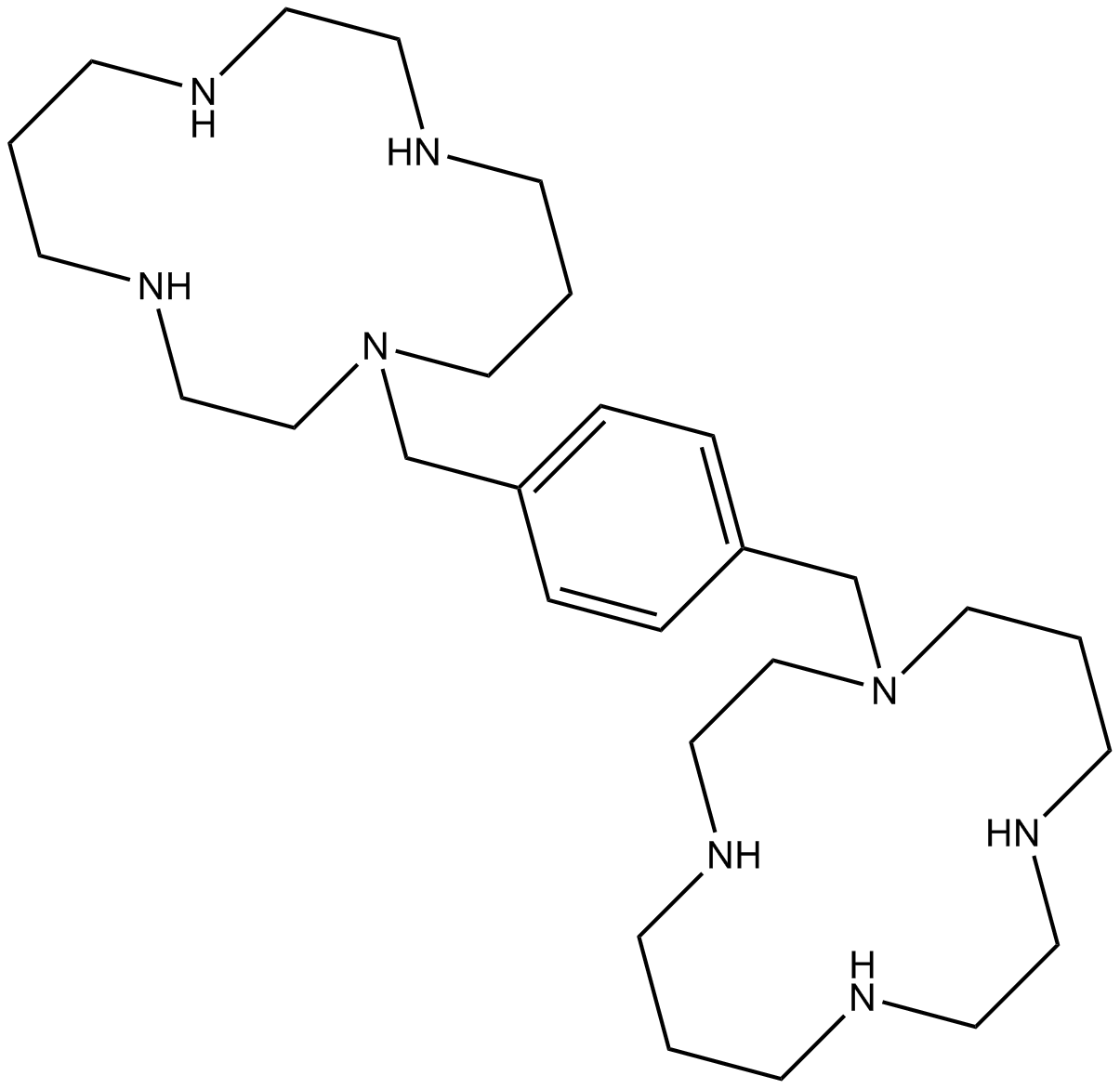Plerixafor (AMD3100) (Synonyms: AMD 3100, JM 3100, SDZ SID 791) |
| Catalog No.GC14745 |
Plerixafor (AMD3100) es un pequeño inhibidor molecular de CXCR4 y la quimiotaxis mediada por CXCL12 con valores de IC50 de 44 nM y 5.
Products are for research use only. Not for human use. We do not sell to patients.

Cas No.: 110078-46-1
Sample solution is provided at 25 µL, 10mM.
Plerixafor(AMD3100) is a small molecule inhibitor of CXCR4 and CXCL12-mediated chemotaxis with IC50 values of 44 nM and 5.7 nM, respectively [1].Using the CCRF CEM T-cell line that constitutively expresses CXCR4 ,Plerixafor (AMD3100) was an antagonist of SDF-1/CXCL12 ligand binding. Plerixafor (AMD3100) inhibits SDF-1 mediated GTP-binding, SDF-1 mediated calcium flux, and SDF-1 stimulated chemotaxis [1].
In U2OS cells, When Plerixafor (AMD3100) concentration was 300nM, Inhibition of cell invasion with AMD3100 was 75%[2].The cell proliferation of U87MG cells exposed to peptide R or Plerixafor (AMD3100) was evaluated.Cells treated with Plerixafor (AMD3100) showed a modest reduction in cell proliferation compared with cells stimulated with CXCL12[6].
An increased number of colony-forming MSC in the peripheral blood after injection of all compounds in a tibia fracture mouse model. However, the number and size of the colonies were highest in IGF1 plus Plerixafor (AMD3100) injected mice compared to PDGF, SCF and VEGF treated groups, in combination with Plerixafor (AMD3100).Treatment with IGF1 and Plerixafor (AMD3100) results in augmented bone growth in a mouse segmental defect model[3]. Plerixafor (AMD3100) (2 mg/kg) administration to UUO mice exacerbates renal interstitial T cell infiltration, resulting in increased production of the pro-inflammatory cytokines IL-6 and IFN-γ and decreased expression of the anti-inflammatory cytokine IL-10[4]. Both perivascular and interstitial fibrosis are significantly reduced by the CXCR4 antagonist, Plerixafor (AMD3100) at 8 weeks[5].Three adults with WHIM syndrome who received Plerixafor (Plerixafor (AMD3100)) 0.01 to 0.02 mg/kg subcutaneously twice daily for 6 months had increasing circulating white blood cells and fewer associated infections[7].
References:
[1]: Zabel BA, Wang Y,et,al. Elucidation of CXCR7-mediated signaling events and inhibition of CXCR4-mediated tumor cell transendothelial migration by CXCR7 ligands. J Immunol. 2009 Sep 1;183(5):3204-11. doi: 10.4049/jimmunol.0900269. Epub 2009 Jul 29. PMID: 19641136.
[2]: Li J, OupickÝ D. Effect of biodegradability on CXCR4 antagonism, transfection efficacy and antimetastatic activity of polymeric Plerixafor. Biomaterials. 2014 Jul;35(21):5572-9. doi: 10.1016/j.biomaterials.2014.03.047. Epub 2014 Apr 13. PMID: 24726746; PMCID: PMC4038967.
[3]: Kumar S, Ponnazhagan S. Mobilization of bone marrow mesenchymal stem cells in vivo augments bone healing in a mouse model of segmental bone defect. Bone. 2012 Apr;50(4):1012-8. doi: 10.1016/j.bone.2012.01.027. Epub 2012 Feb 9. PMID: 22342795; PMCID: PMC3339043.
[4]: Yang J, Zhu F, et,al. Continuous AMD3100 Treatment Worsens Renal Fibrosis through Regulation of Bone Marrow Derived Pro-Angiogenic Cells Homing and T-Cell-Related Inflammation. PLoS One. 2016 Feb 22;11(2):e0149926. doi: 10.1371/journal.pone.0149926. PMID: 26900858; PMCID: PMC4763993.
[5]: Chu PY, Walder K, et,al. CXCR4 Antagonism Attenuates the Development of Diabetic Cardiac Fibrosis. PLoS One. 2015 Jul 27;10(7):e0133616. doi: 10.1371/journal.pone.0133616. PMID: 26214690; PMCID: PMC4516278.
[6]: Mercurio L, Ajmone-Cat MA, et,al. Targeting CXCR4 by a selective peptide antagonist modulates tumor microenvironment and microglia reactivity in a human glioblastoma model. J Exp Clin Cancer Res. 2016 Mar 25;35:55. doi: 10.1186/s13046-016-0326-y. PMID: 27015814; PMCID: PMC4807593.
[7]: McDermott DH, Liu Q, et,al. A phase 1 clinical trial of long-term, low-dose treatment of WHIM syndrome with the CXCR4 antagonist plerixafor. Blood. 2014 Apr 10;123(15):2308-16. doi: 10.1182/blood-2013-09-527226. Epub 2014 Feb 12. PMID: 24523241; PMCID: PMC3983611.
Average Rating: 5 (Based on Reviews and 7 reference(s) in Google Scholar.)
GLPBIO products are for RESEARCH USE ONLY. Please make sure your review or question is research based.
Required fields are marked with *




